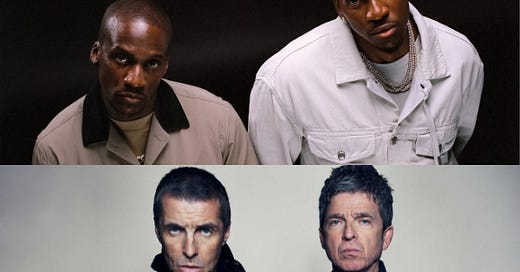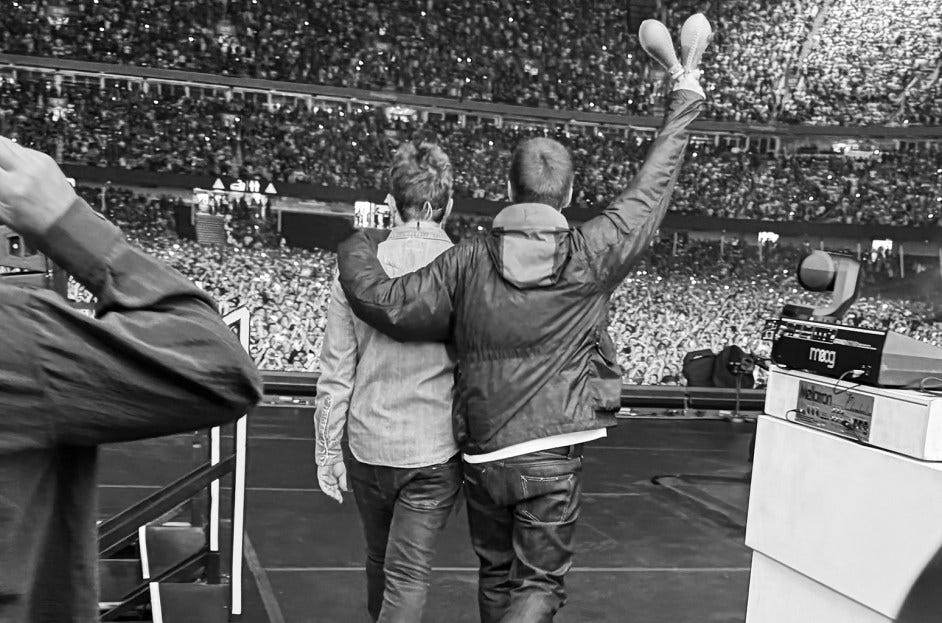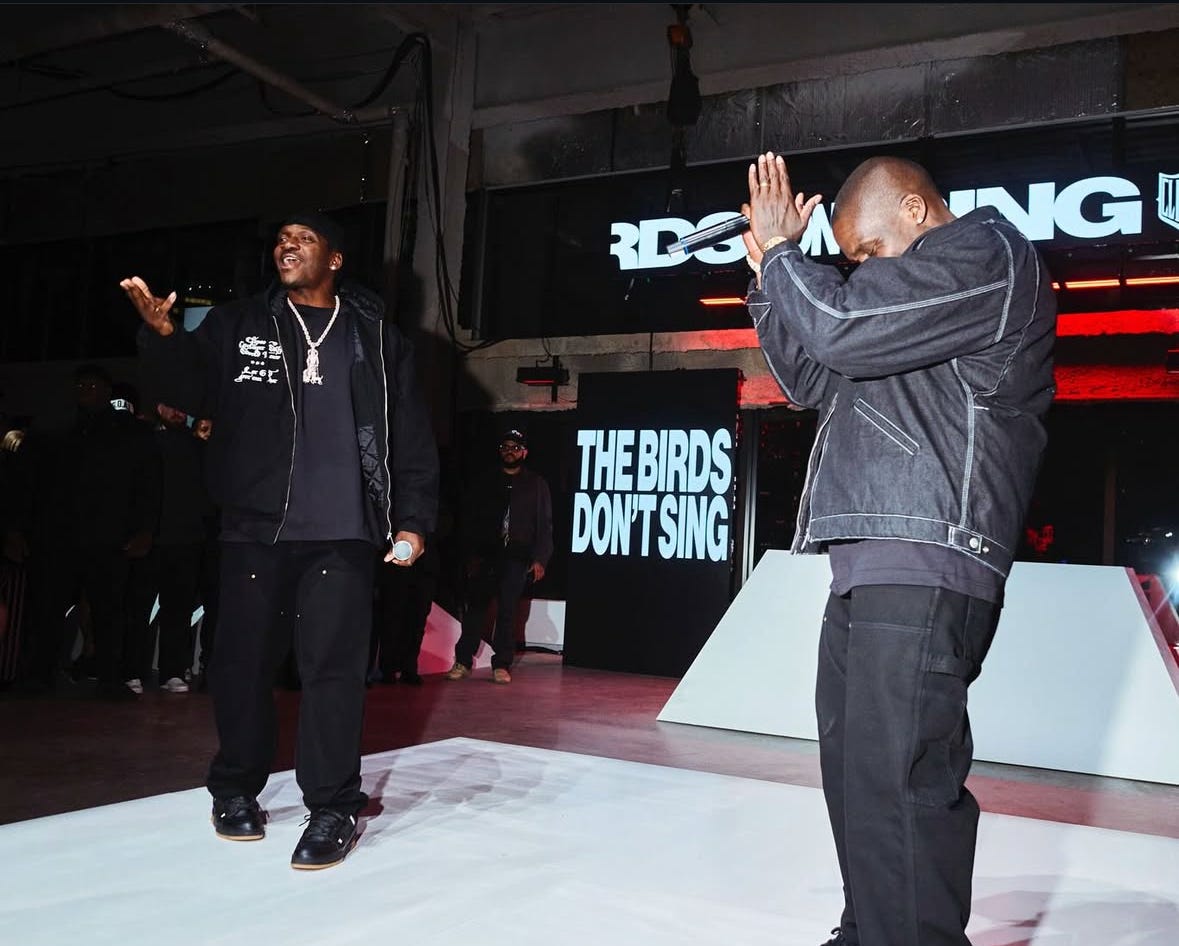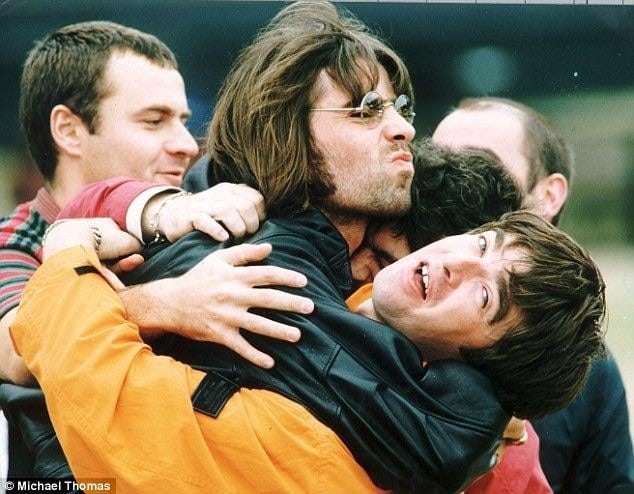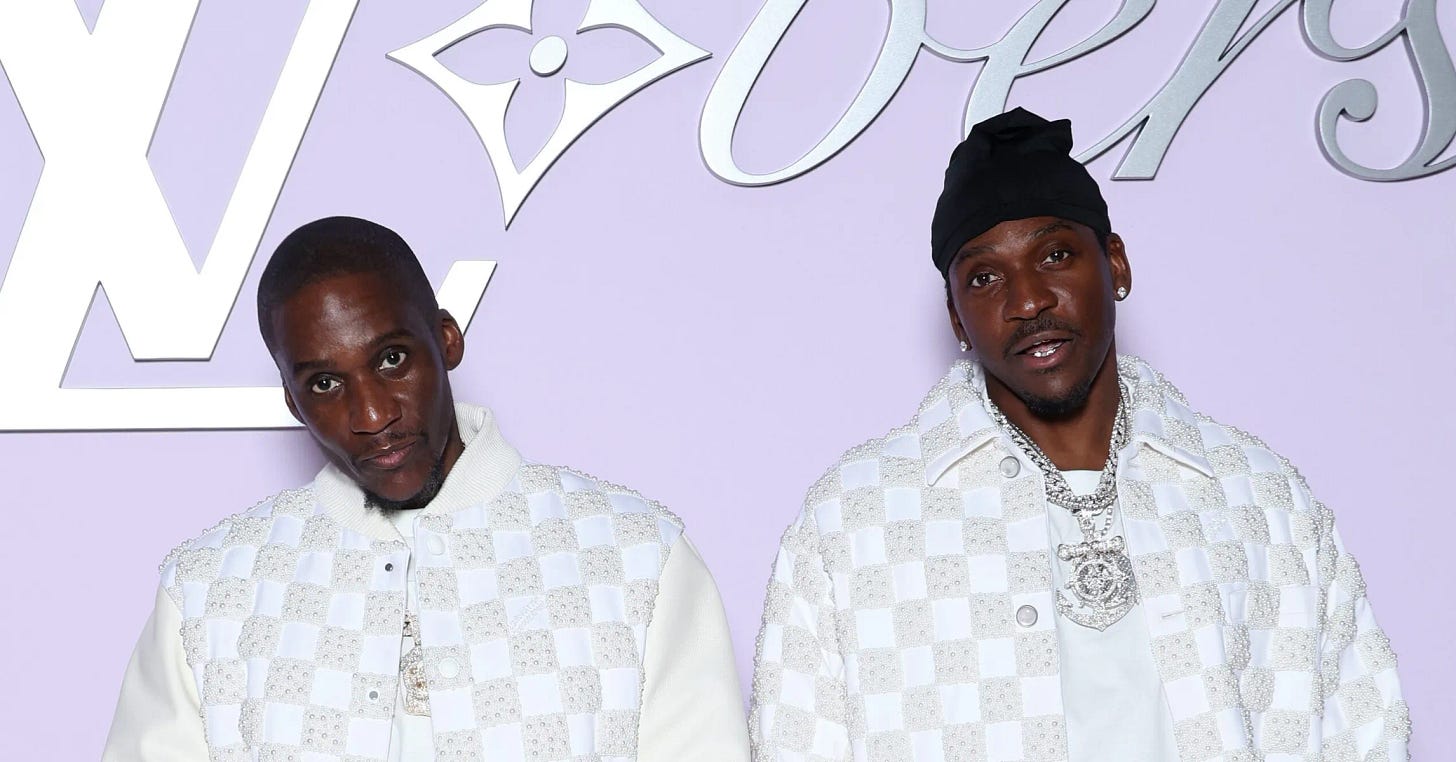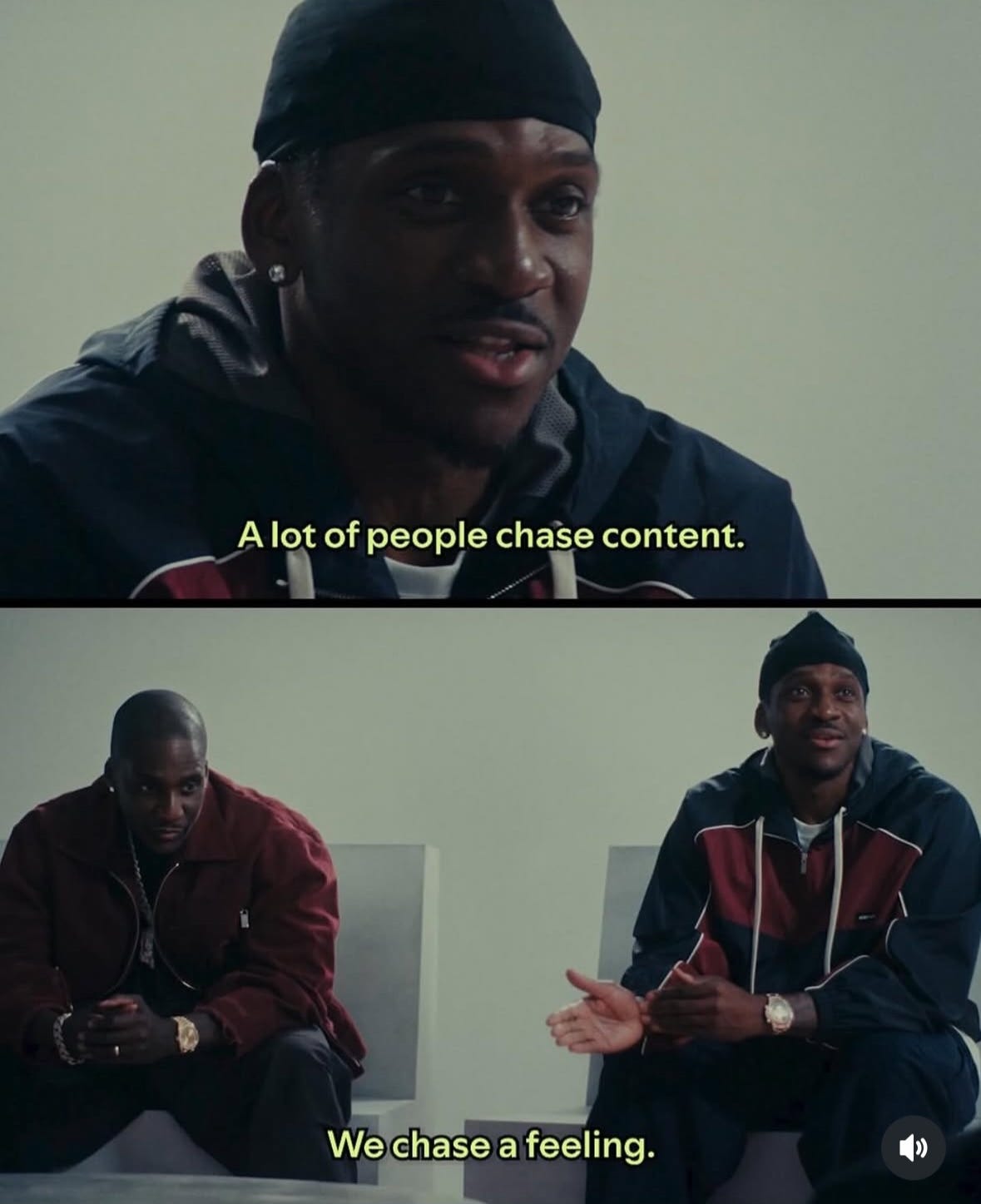A Tale of Four Brothers: Clipse and Oasis Run the Summer
Two legendary duos return after 16 years apart to dominate summer 2025. Their success reveals something profound about authenticity, algorithms, and who gets to matter in music.
The summer of 2025 belongs to the brothers. Not just any brothers: The Thornton and Gallagher Brothers. Two sets of siblings who've managed to commandeer the entire cultural conversation while everyone else was busy chasing TikTok virality and algorithmic approval.
Clipse and Oasis. Manchester and Virginia Beach. Britpop and Luxury Coke rap and gritty evangelism. Different worlds, same generation, identical energy: middle-aged men refusing to play by the rules of a youth-obsessed industry. And guess what? They're winning.
The Unlikely Parallel
On July 4th, Liam and Noel Gallagher stepped onto a Cardiff stage together for the first time in 16 years. Across the Atlantic, Pusha T and Malice were preparing for their reunion tour, their first nationwide run in 16 years. The symmetry is cosmic.
Liam Gallagher is 52. Noel is 58. Malice is 52. Pusha T is 48. These aren't your typical comeback artists desperately clinging to relevance. These are seasoned veterans in full command of their artistic authority but still hungry enough to deliver with conviction.
Four brothers in their 40s and 50s are about to run the entire summer. And they're not apologising for it.
The Numbers On The Board
The Oasis reunion tour is projected to gross $540 million. Half a billion dollars. For a band that hasn't existed for 16 years. The Gallagher brothers could each walk away with £400 million.
But here's the kicker: this isn't just boomer nostalgia. Oasis streams jumped 320% after their reunion announcement, and over half of those new listeners are Gen Z. Kids who weren't even born when "Wonderwall" was everywhere are discovering it like a fresh release. Meanwhile, their parents are crying actual tears because the band that soundtracked their youth is back. And to wrap up the cross-generational appeal, adidas dropped a stellar Oasis capsule collection with pieces for the whole family. From a cultural impact POV, it’s been a stellar rollout. But commercially? It’s been astronomical.
Clipse dropped "Let God Sort Em Out" on July 11th—their first album since 2009. They paid seven figures to escape their Def Jam deal rather than compromise their vision. That's not desperation: that's confidence. They know just how incredibly anticipated this project is, they know it’s likely their last, and they know they had to get it right.
Which they have - from the hour-long Apple Music episode with Ebro, to the Complex interview with Pharrell, to the Carharrt collaboration and the pop-up show at Jah Jah Soundsystem during Fete de la Musique where I saw Clipse live for the first time in my life, this rollout has been exceptional. They’ve covered all bases: traditional media, digital, and street. Clipse hasn’t missed a beat yet.
The Brother Code
What makes both acts magnetic isn't just the music: it's the human drama. The Gallagher brothers are legendary for their feuds. Their relationship has been described as "volatile" so many times, it's become their brand. When they split in 2009 after Liam allegedly threw a plum at Noel's head (or was it a guitar? The mythology changes), it felt inevitable.
Their reunion announcement broke the internet not because people missed the music (though they did), but because everyone wanted to see if these two could share a stage without killing each other - it’s Britpop with a side of popcorn.
Clipse's story is different but equally compelling. When Malice left the industry in 2010 to focus on his faith, changing his name to No Malice, it wasn't just a career break; it was a spiritual awakening. For 15 years, he watched his brother build a solo career, dropping classic after classic while he deepened his faith and journey with God.
Their reunion represents something deeper than nostalgia. It's about reconciliation, about choosing family over individual success, but also that idea of about proving that creative bonds can defy the bitterest feuds with the help of time.
There's something primal about sibling relationships that translates perfectly to music. Brothers, who are close - and particularly close in age - know each other too well to fake anything. They've shared rooms, fought and scuffed and survived childhood together. That history creates a creative dynamic you can't manufacture.
The Gallaghers' dynamic has always been that of combustible genius. Noel writes the songs, Liam delivers them with unmatched attitude. And when they click, they're unstoppable. When they're not, it's cinema.
Pusha T and Malice represent a different kind of brotherhood.
Where the Gallaghers channel sibling rivalry into creative fuel, the Thornton brothers operate as uniquely complementary forces. Pusha brings the street-hardened wordplay, Malice provides the spiritual weight. Together, they create something neither could achieve alone.
The Thornton brothers would make perfect doubles players.
The Gallaghers couldn’t share the same side of the court without a fight.
The key to their dynamics.
The Authenticity Crisis
In 2025, authenticity in music is increasingly rare. The thing that made artists, artists. The thing that artists coveted more than success, individuality, is mostly disappearing or being throttled by algorithms in favour of the most TikTok/Reel pliable sounds instead. Everything is designed for immediate consumption rather than lasting impact. As I covered in this piece a month back:
AI is writing songs. Artists are uploading tracks directly to TikTok. The concept of an "album" might actually feel small to modern artists, a means to an end to their real purpose now: marketing.
Enter Oasis and Clipse: two acts that represent the exact opposite of everything modern music stands for. They make music the old way: slowly, deliberately, with the kind of craftsmanship that can only come from decades of experience.
As Pusha T explained: "You see great rappers all the time, but there's something a little off about it." He's talking about the artificiality that plagues contemporary music. "Let God Sort Em Out has no such problems."
Clipse, most recently, and Oasis - historically, understand the true power of the LP. That is the metric of a good artist: albums. Clipse put 15 years of lived experience into this LP. Oasis returned on the strength of their legendary catalogue. That is the value of quality albums and back catalogues - you will always have something to fall back on.
These aren't artists chasing trends. They're still setting them. Proving that in music, there’s still a place for the classic methods. That depth matters more than virality. That sometimes the best response to a youth-obsessed culture is to forget about age and focus on the art.
The Economic Revolution
Both reunions represent more than nostalgic cash grabs; they're proof of concept for a new economic model. When Def Jam wanted Clipse to remove a Kendrick Lamar collaboration for fear it would reignite the Drake beef, the brothers said no. They paid seven figures to buy their freedom and released the album independently through Roc Nation.

These artists have built enough equity in their brands and businesses that they can afford to walk away from major label deals rather than compromise their vision. And that Kendrick verse? Worth the money.
Oasis demonstrates the power of scarcity in the attention economy. By staying broken up for 16 years, by refusing to dilute their mystique with half-hearted reunions, they've created cultural demand that absolutely no marketing budget could buy. But the Gallaghers are known for canny and controversial cultural commentary. They probably calculated that the 90’s nostalgia love-in + the dire state of music would make a perfect time to come back. And they were right.
The Generational Statement
Here's what's happening: Generation X is refusing to age out gracefully. The generation that grew up with MTV, that experienced the last great era of album-based music culture, that remembers when discovering new music required active, physical effort - they're not ready to hand over cultural relevance to their kids.
This generation has something younger artists don't: institutional memory. They remember when music was communal, when albums were events when artists took risks because the rewards for greatness were worth it.
Music sociologist Andy Bennett describes Oasis as "the sonic voice of Northern pride in a time of cultural centralisation." And the Clipse are eminent from an era where your career could be determined by what state you represented. Their sound is closest to East Coast rap, but they aren’t from the Tri-State. They’re from a long line of upward-punching generation-defining musicians from Virginia, a cohort that includes Pharrell Williams, Missy Elliot, Chad Hugo, Teddy Riley and Timberland. This distance from the hubs of hip-hop in the golden age: East or West Coasts, gave them a freedom, a temerity, even, to defy their peers and, rather than assimilate, design a sound that could represent regional authenticity in a globalised, homogenised music landscape.
Content vs. Excellence
Both acts are rejecting the modern music industry's obsession with content over excellence. Streaming platforms want constant releases. Social media demands daily engagement. The algorithm rewards quantity over quality.
Oasis and Clipse are saying: f*ck that. They're making music designed for permanence, not playlists. They're crafting albums meant to be experienced as complete works, not chopped up into TikTok snippets.
As Pusha T put it: "Whatever it is that I do, I try to make it so that I can compete and make something so great that it competes with everything without compromising who I am."
This foundation of timelessness is the driving principle of these artists, and that’s why the long-awaited album is being called album of the year, and Oasis tickets are reselling for over £10000 globally.
Build for eternity, achieve artistic immortality.
The Old Head Renaissance
Clipse's return is part of a broader old-head renaissance in hip-hop. In the past year alone, we've seen comeback albums from Slick Rick, Redman, and Wu-Tang Clan. The growth of independent distribution, direct-to-fan marketing, and a generation of middle-aged hip-hop heads with disposable income has made these reunions economically viable.
But it's more than economics, it's cultural correction. After some misdirected stylistic years in hip-hop, audiences are hungry for lyrical complexity, for storytelling, for the kind of craftsmanship that can only come with experience. From the artists who build the scaffolding of the genre.
The Dancefloor Test
One thing both acts understand that modern music often misses: the dancefloor test. Oasis created anthems designed for mass singalongs. Clipse mixed dense and dark raps with occasionally catchy beats. They understood that music isn't just content to be consumed: it's a communal experience to be shared.
That tactile relationship with music has been largely lost in the streaming era. But when 70,000 people sing "Wonderwall" together at Wembley, or when "Grindin'" comes on at the right party, you remember what music used to be and could be again.
The Verdict
The summer of 2025 proves something important: great music doesn't have an expiration date. Authenticity doesn't diminish with age. It deepens. Experience isn't a liability: it's a superpower.
They're proving that in a world obsessed with the next big thing, sometimes the best thing is what was always great in the first place. Just a bit older and wiser and capable of showing new tricks learnt along the road.
The summer belongs to these brothers because brothers understand something solo artists often miss: the most powerful music comes from tension, creative, personal, and generational. In a fractured world hungry for something real, Oasis and Clipse are delivering exactly what we didn't know we needed.


